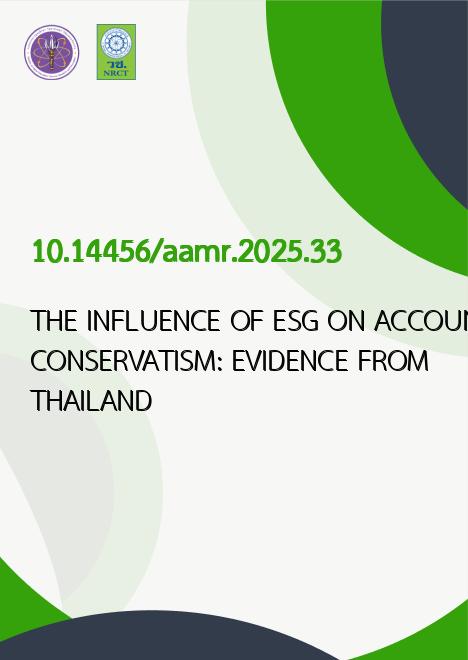
|
THE INFLUENCE OF ESG ON ACCOUNTING CONSERVATISM: EVIDENCE FROM THAILAND |
|---|---|
| รหัสดีโอไอ | |
| Creator | Prawat BENYASRISAWAT |
| Title | THE INFLUENCE OF ESG ON ACCOUNTING CONSERVATISM: EVIDENCE FROM THAILAND |
| Contributor | Nacha VATANAVILAI, Janjao SUPORNRUNGCHAROEN, Attawan JUNTASUTHO, Atinan CHITMONKONGSUK |
| Publisher | Asian Administration and Management Review |
| Publication Year | 2568 |
| Journal Title | Asian Administration and Management Review |
| Journal Vol. | 8 |
| Journal No. | 2 |
| Page no. | Article 8 |
| Keyword | ESG, Accounting Conservatism, Thailand, Loss Recognition, Timeliness |
| URL Website | https://so01.tci-thaijo.org/index.php/AAMR |
| Website title | https://so01.tci-thaijo.org/index.php/AAMR/article/view/279367 |
| ISSN | 2730-3683 |
| Abstract | This study examines the impact of Environmental, Social, and Governance (ESG) factors on accounting conservatism, measured by timely loss recognition, in Thai-listed firms from 2018 to 2023 (2,470 firm-year observations). The results reveal a positive association between ESG performance and accounting conservatism, suggesting that firms with stronger ESG practices tend to recognize losses more promptly. We analyze ESG performance using ratings from both the Stock Exchange of Thailand (SET) and Morningstar, finding qualitatively similar results. Further analysis demonstrates that factors such as firm size, price-to-book ratio, and leverage influence the relationship between ESG and conservatism. Our findings contribute to the literature by providing insights into an emerging market context and offer practical implications for regulators and investors. Specifically, we suggest that stakeholders benefit from ESG disclosures, which enhance transparency and facilitate well-informed decision-making processes. It highlights the role of ESG as a mechanism to mitigate information asymmetry in a complex financial environment. |